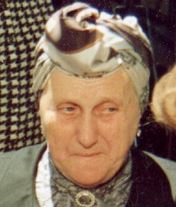 Esther Jungreis (1936-2016) was born in Hungary, the daughter of a rabbi. During the Holocaust, the family was sent to Bergen-Belsen, and later loaded up on a train headed for Auschwitz. On route, they managed to escape to Switzerland with the help of Rudolph Kastner’s Aid and Rescue Committee. The quota for migrants to Israel was filled, so the family was given papers to go to the States. Jungreis went on to marry a rabbi and settled in North Woodmere, New York, where the couple founded the town’s Jewish Center and Congregation Ohr Torah. Seeing the rampant assimilation in the United States, Jungreis made it her life’s work to prevent what she saw as a “spiritual holocaust”. In 1973, she started an organization called Hineni, aimed at inspiring Jewish youth to return to their roots. Under her dedicated leadership and moving speeches, Hineni grew to become an international organization, no longer focused solely on youth but rousing countless young and old alike. Jungreis organized events and gave lectures around the world – visiting fifteen or more countries a year was normal for her. Her weekly class drew as many as 1500 people at a time. Meanwhile, Jungreis wrote a regular column for The Jewish Press (the world’s largest English-language Jewish paper) for some 45 years, making it the longest running column in the publication’s history. She also wrote four best-selling books, and had a television programme. In 2004, the Rebbetzin spoke at the Republican National Convention, and in 2008 was selected by President Bush to join him on his delegation to Jerusalem for Israel’s 60th anniversary. Today, she is recognized as one of the central pioneers of the modern kiruv (Jewish outreach) movement. Sadly, the Rebbetzin passed away yesterday. She worked tirelessly until the very end, and in her last article – published just last week – finished with these words: “When will we wake up? When will we don our priestly garments and fulfill our G-d-given destiny and be ‘a light unto all mankind’?”
Esther Jungreis (1936-2016) was born in Hungary, the daughter of a rabbi. During the Holocaust, the family was sent to Bergen-Belsen, and later loaded up on a train headed for Auschwitz. On route, they managed to escape to Switzerland with the help of Rudolph Kastner’s Aid and Rescue Committee. The quota for migrants to Israel was filled, so the family was given papers to go to the States. Jungreis went on to marry a rabbi and settled in North Woodmere, New York, where the couple founded the town’s Jewish Center and Congregation Ohr Torah. Seeing the rampant assimilation in the United States, Jungreis made it her life’s work to prevent what she saw as a “spiritual holocaust”. In 1973, she started an organization called Hineni, aimed at inspiring Jewish youth to return to their roots. Under her dedicated leadership and moving speeches, Hineni grew to become an international organization, no longer focused solely on youth but rousing countless young and old alike. Jungreis organized events and gave lectures around the world – visiting fifteen or more countries a year was normal for her. Her weekly class drew as many as 1500 people at a time. Meanwhile, Jungreis wrote a regular column for The Jewish Press (the world’s largest English-language Jewish paper) for some 45 years, making it the longest running column in the publication’s history. She also wrote four best-selling books, and had a television programme. In 2004, the Rebbetzin spoke at the Republican National Convention, and in 2008 was selected by President Bush to join him on his delegation to Jerusalem for Israel’s 60th anniversary. Today, she is recognized as one of the central pioneers of the modern kiruv (Jewish outreach) movement. Sadly, the Rebbetzin passed away yesterday. She worked tirelessly until the very end, and in her last article – published just last week – finished with these words: “When will we wake up? When will we don our priestly garments and fulfill our G-d-given destiny and be ‘a light unto all mankind’?”
Words of the Week
A long life is not good enough, but a good life is long enough.
– Rabbi Theodore Meshulem Jungreis


